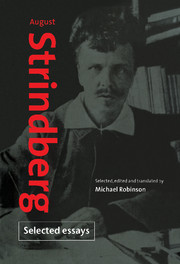Book contents
- Frontmatter
- Contents
- Notes on the text
- Introduction
- from Vivisections (1887)
- ‘On Modern Drama and Modern Theatre’ (1889)
- from Vivisections II (1894)
- ‘I’
- ‘The Making of an Aspasia’
- ‘Nemesis Divina (Cont.)’
- ‘The New Arts! or The Role of Chance in Artistic Creation’
- ‘Whence We Have Come’
- ‘Character a Role?’
- ‘Césarine’ (1894)
- ‘Deranged Sensations’ (1894)
- ‘In the Cemetery’ (1896)
- from Jardin des Plantes (1896)
- ‘On the Action of Light in Photography’ (1896)
- ‘A Glance into Space’ (1896)
- ‘Edvard Munch's Exhibition’ (1896)
- ‘The Synthesis of Gold’ (1896)
- ‘Contemporary Gold-Making’ (1896)
- ‘The Sunflower’ (1896)
- ‘The Mysticism of World History’ (1903)
- ‘August Strindberg on Himself’ (1909)
- Notes and commentary
- Index
‘Character a Role?’
Published online by Cambridge University Press: 18 December 2009
- Frontmatter
- Contents
- Notes on the text
- Introduction
- from Vivisections (1887)
- ‘On Modern Drama and Modern Theatre’ (1889)
- from Vivisections II (1894)
- ‘I’
- ‘The Making of an Aspasia’
- ‘Nemesis Divina (Cont.)’
- ‘The New Arts! or The Role of Chance in Artistic Creation’
- ‘Whence We Have Come’
- ‘Character a Role?’
- ‘Césarine’ (1894)
- ‘Deranged Sensations’ (1894)
- ‘In the Cemetery’ (1896)
- from Jardin des Plantes (1896)
- ‘On the Action of Light in Photography’ (1896)
- ‘A Glance into Space’ (1896)
- ‘Edvard Munch's Exhibition’ (1896)
- ‘The Synthesis of Gold’ (1896)
- ‘Contemporary Gold-Making’ (1896)
- ‘The Sunflower’ (1896)
- ‘The Mysticism of World History’ (1903)
- ‘August Strindberg on Himself’ (1909)
- Notes and commentary
- Index
Summary
What one is, and what one believes oneself to be, are regarded as two different things. But what does it really mean, to be at one with one's character? Is it not the case that we continually adapt ourselves to people and to circumstances, that reality, so varied and shifting, makes us changeable, and that we play along in the comedy of life without knowing it? The criminal is supposed to have formulated a philosophical system before committing the crime, and thus exonerates himself from guilt in advance. He plays the innocent before himself, and finds he is in the right at the moment when the crime is committed. The contrition which follows his imprisonment can therefore stem only from his isolation, from being uprooted out of his natural milieu; in detention he is no longer sustained by his accomplices' opinions and the presence of the judges, with their imposing attributes of abstract power, with their superior logic, demolish the sophisms of the guilty man. A few months of abstinence, with little food, in solitude in prison, and he is no longer the same man. There are notorious cases in which an innocent man has been induced by the examining magistrates into accepting that he is guilty, so powerful is the influence of the milieu and those around us.
Let a steady worker lose his position and become idle, and within a couple of weeks you will have a drunkard, an incompetent, perhaps a candidate for the petty sessions.
- Type
- Chapter
- Information
- August Strindberg: Selected Essays , pp. 111 - 117Publisher: Cambridge University PressPrint publication year: 1996



